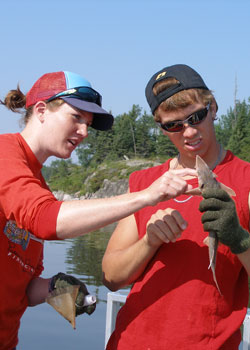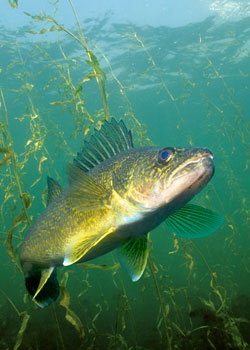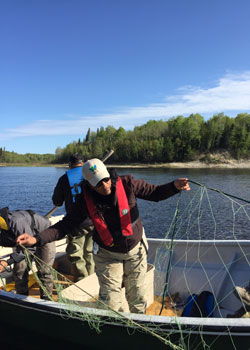The challenge
The Ontario Northern Boreal contains thousands of lakes, five of the last undammed and intact large rivers left in the world, and the largest wetlands in North America. This vast landscape is more water than land, and all of this water is home to more than 50 species of fish – the highest fish biodiversity in a largely still natural state left in Canada.
Healthy populations of fish are integral for First Nations people who live in northern Ontario. Fish is an important subsistence food source in an area where grocery stores are filled with highly processed and expensive food that is flown in from the south, and fishing is a culturally and spiritually important connection to a traditional way of life. Fish also support economically important recreational fisheries, especially fly-in fishing tourism. And they are a key component of the boreal ecosystem, providing a food source for animals ranging from birds to bears.
However, these fish are under threat from climate change and from industrial activities like hydropower dams, mines, and forestry, as well as from the roads and transmissions lines that industrial activities bring with them. There is also a lack of scientific data on fish in the vast northern boreal in Ontario, and so we often don’t have a complete understanding of how fish are being impacted by these forces.
In order to safeguard healthy fish populations for future generations, we need better information and monitoring for fish in northern Ontario, and this information needs to be integrated into planning and management.
-engbretson.jpg?ver=2019-02-26-181328-403)



What we are doing and why
WCS Canada is working to fill critical knowledge gaps and identify the main threats for freshwater fish in the Ontario Northern Boreal, and then acting to address these threats with evidence-based solutions.
We are working to fill knowledge gaps and identify the main threats for freshwater fish by supporting the development of community-based monitoring programs; using computer-based modelling; and through targeted on-the-ground data collection.
We are acting to address threats by working to improve planning processes in order to limit the impacts of development on fish, and by working directly with decision-makers to improve management of existing dams and other developments.
Our strategies
We seek to
improve planning in order to limit the impacts of development on fish. Fish are
particularly sensitive to cumulative impacts because watersheds are connected, and impacts from a localized development can spread downstream. We are
calling for big-picture regional planning for northern Ontario, so that the cumulative impacts of development at the watershed level are considered and accounted for in planning processes.
We strive to improve protection for fish using advanced computer modelling to identify the watersheds in northern Ontario that currently have the highest freshwater fish biodiversity, and to predict which watersheds will have the highest freshwater fish biodiversity under future climate change scenarios, in order to prioritize areas for protection. For existing developments, we work to improve management. For example, we have been working with Moose Cree First Nation Resource Protection on an ecological study of lake sturgeon at one of the largest hydropower facilities in Ontario, in order to identify whether management practices can be improved to reduce the impact of the dams (which are partially owned by Moose Cree First Nation) on this important fish species. We need data in order to make evidence-based decisions, and so we work to improve monitoring by supporting community-based monitoring; compiling and adding to existing scientific data; and collecting data on lake sturgeon in the intact North French River (Kah-pana-yow sîpi or Meh-ko-pwa-meh-ŝtik sîpi). Our research team, alongside Moose Cree First Nation Resource Protection, launched a website for this joint lake sturgeon research project: Learning from Lake Sturgeon. This website is a resource for Moose Cree community members to learn about the project, see opportunities for joining our youth program, report their own river observations, and get involved/contribute to our data collection in the Moose Cree Homeland (Kit Aski Nahnuun).
Latest news
- WCS Canada scientist Dr. Cheryl Chetkiewicz discusses how WCS Canada is identifying and addressing the threat to freshwater fish from climate change and the cumulative impacts of development in a National Geographic blog.